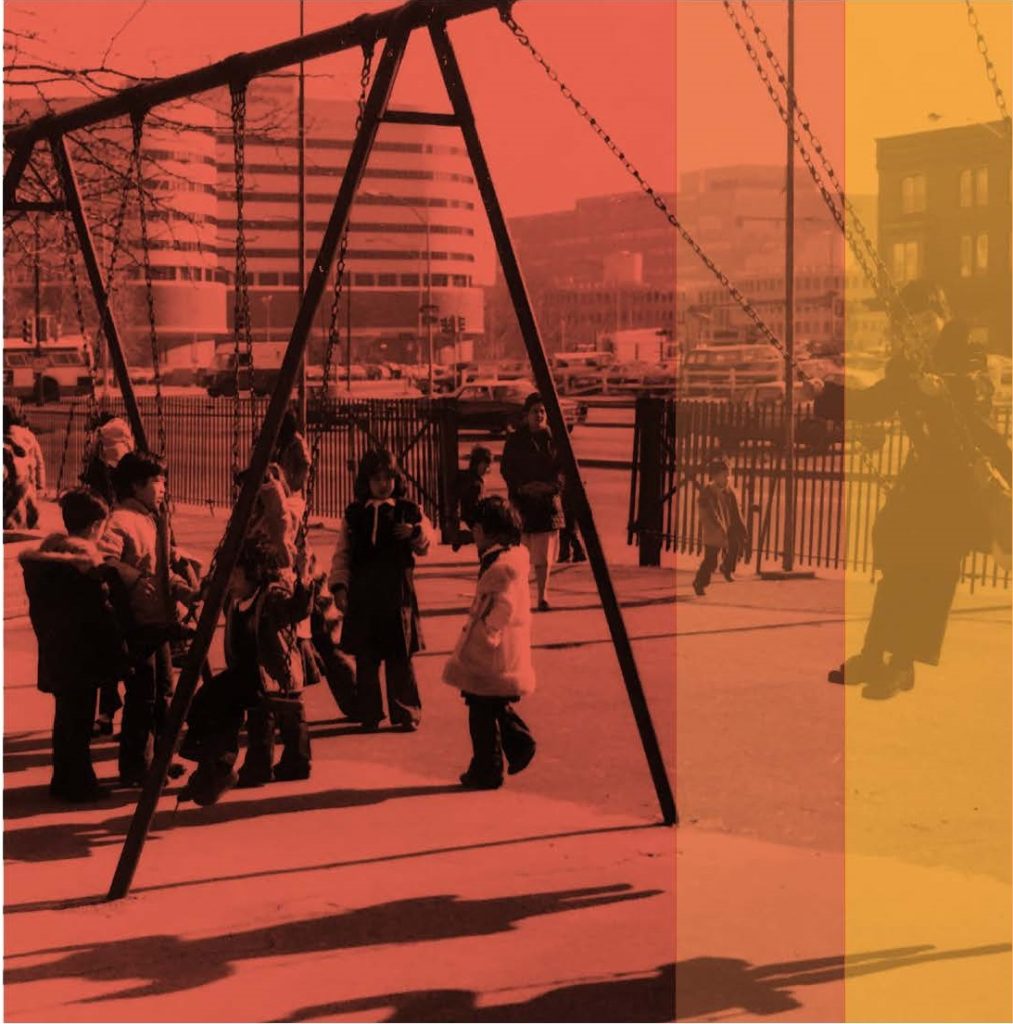Chinatown Future Histories: Public Space and Equitable Development
華埠未來歷史:公共空間和公平發展
PHASE II
The Chinatown Future Histories project enters a second phase in fall 2020 as it invests in leadership development of community advocates and immigrant business owners to achieve equitable development priorities identified in the first phase, including equitable access and programming of the newly built Rail Park and Crane Community Center. Nonprofits and park organizations will support and participate in a coalition as Phase II builds community capacity and explores a path to advance a value capture strategy.
PHASE I

In early 2019, PCDC began collaborating with PolicyLink to develop a community-driven equitable development strategy, Chinatown Future Histories: Public Space and Equitable Development. The purpose was to resist increasing gentrification and displacement pressures facing Chinatown. Through community meeting and dinners, we engaged Chinatown community members to learn about their priorities and discuss what they believe is equitable development. We also hosted a one-day Equity Lab, which was a gathering of community stakeholders, policy experts, and decision makers, with an explicit goal of working out solutions around residential, commercial, and cultural gentrification.
Urban Partners completed an analysis on Philadelphia Chinatown demographic change as part of the project. The presentation can be accessed here.
For more information, please refer to the following documents.
Equity Lab Recap
On October 17, 2019, PCDC and PolicyLink co-hosted an invitation-only “Equity Lab” where Chinatown community members were brought together with local and national leaders in community development and public space conservancy to develop an actionable agenda that protects low-income residents, immigrants, and people of color in Philadelphia’s Chinatown. The event builds on a community engagement process gathering insights about the loss of opportunities for low-income and immigrant populations in Chinatown and the values and identity of the community. This process discussed how new investments can directly and intentionally benefit community members.
Philadelphia Rail Park Property Value Impact Study
Strategic Economics was retained by PolicyLink a to conduct research and analysis of the economic impacts of the Philadelphia Rail Park on the property values in surrounding neighborhoods, and to identify potential strategies that can be used to take advantage of increases in property value to mitigate potential gentrification and displacement effects. Urban Partners, retained by the Philadelphia Chinatown Development Corporation (PCDC), developed a model to estimate the anticipated increase in property values and the annual increase in city tax revenues. The results and recommendations are designed to inform efforts in the Chinatown neighborhood, as well as other Philadelphia neighborhoods experiencing “green gentrification” and displacement pressures.
Chinatown Future Histories Project Report was launched on July 22, 2020, and the Executive Summary is in two languages: English, Chinese:
This report explores equity challenges in gentrifying communities and how policymakers and practitioners can support cities in housing markets facing both rapid growth and decades-old disinvestment, and examines the ways in which the experiences of Asian Americans and Pacific Islanders in gentrifying neighborhoods parallel or differ from other racial/ethnic groups.
A panel discussion as a continuance of the Chinatown Future Histories conversation is hosted by PCDC in partnership with New Mainstream Media on July, 22, 2020. Watch the recorded event here.
第二期
華埠未來歷史項目第二期在2020年的秋季開始,該項目將專注發展社區倡導者和移民創業者的領導力,以實現項目第一期確定的公平發展優先事項,包括確保新建的鐵路公園和鼎華中心的公平使用。各非營利組織和公園組織將支持並合力建設社區能力並探索推進增值回收策略的途徑。
第一期
在2019年初,PCDC開始與PolicyLink合作推進一項社區驅動的公平發展戰略,《華埠未來歷史:公共空間與公平發展》。 目的是抵抗華埠面臨的日益嚴重的士紳化和流離失所的壓力。 通過社區會議和晚餐,我們邀請華埠社區成員以了解他們的優先事項,並討論他們認為公平發展的內容。 我們還舉辦了一個為期一天的公平實驗室,該集會由社區利益相關者,政策專家和決策者組成,目的明確圍繞住宅,商業和文化士紳化製定解決方案。
作為該項目的一部分,Urban Partners完成了對費城華埠人口變化的分析。 可以在此處訪問該報告。
點擊以下鏈接瞭解更多項目相關的内容。
公平實驗室回顧
2019年10月17日,PCDC和PolicyLink共同主辦了一個“平等實驗室”,華埠社區成員與地方和全國的社區發展和公共空間保護方面的領導者匯聚在一起,以製定切實可行的議程,保護低收入居民、移民、和費城華埠的有色人種。 該活動以社區參與為基礎,收集有關華埠低收入和移民人口失去的機會以及社區的價值和身份的見解。 此活動討論了新的投資如何直接和有意識地使社區成員受益。
費城鐵路公園對物業價值影響的研究
PolicyLink委托Strategy Economics對費城鐵路公園對周圍社區的房地產價值的經濟影響進行研究和分析,並確定可用於利用房地產價值增加來減輕潛在的士紳化和被迫遷出的潛在策略。費城華埠發展會(PCDC)聘請的Urban Partners開發了一個模型,用於評估房地產價值的預期增長和城市稅收的年度增長。 結果和建議旨在為華埠社區以及費城其他遭受“綠色士紳化”和被迫遷出壓力的社區提供幫助。
華埠未來歷史項目報告在2020年7月22日正式推出,執行摘要有 英文和中文版本。
本報告探討了士紳化社區中的對公平的挑戰,以及政策制定者和從業人員如何為住房市場中面臨快速增長和數十年投資失衡的城市提供支持,並探討了亞裔美國人和太平洋島民在士紳化社區中與其他種族/民族的體驗相似或不同。
PCDC與新主流媒體合作,於2020年7月22日舉行了一次延續華埠未來歷史項目的對話的專題小組討論。在此處觀看錄製的活動影片(中文翻譯版)。